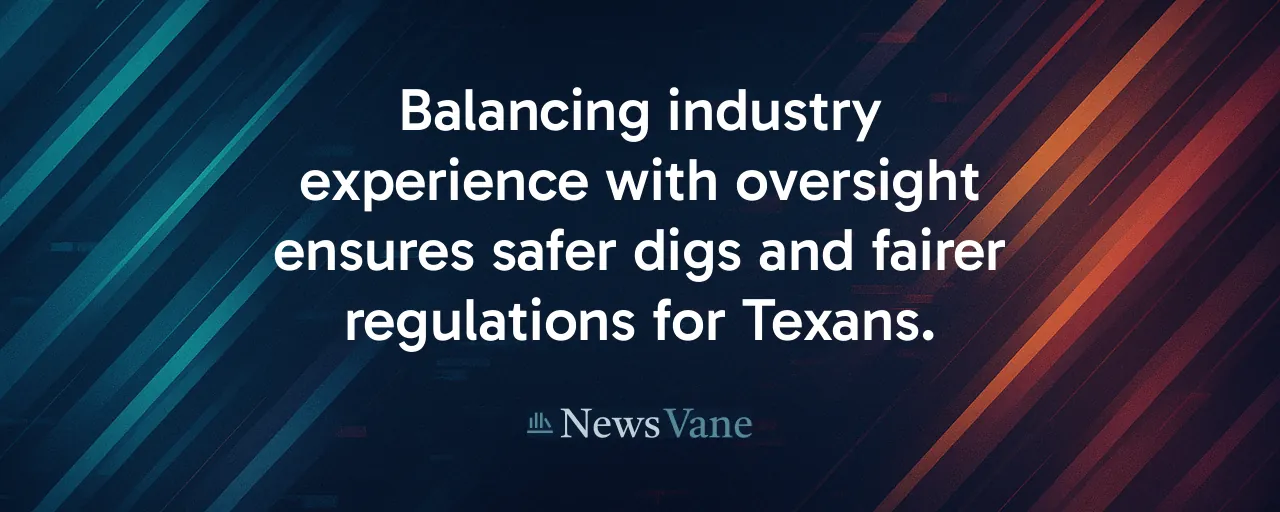A Fresh Voice for Texas Infrastructure
Texas Governor Greg Abbott has named Keith Wall to the Texas One-Call Board, a body tasked with overseeing the state's 'Call Before You Dig' system. This program ensures underground utility lines, like gas and telecom cables, are marked before any digging begins, preventing costly and dangerous accidents. Wall's term, set to end in August 2026, places him at the heart of efforts to keep Texas's infrastructure safe amid rapid growth.
Wall, currently Director of Regulatory Affairs at CenterPoint Energy, brings extensive experience to the role. His work with groups like the Texas Gas Association and the Texas Hydrogen Production Policy Council highlights his deep ties to the energy sector. A Texas A&M finance graduate, Wall combines industry expertise with a practical understanding of economic impacts. For Texans, his appointment raises questions about how it will affect daily life and safety.
The need for strong oversight is undeniable. Nationwide, nearly 200,000 underground utility strikes occur annually, causing millions in damages and occasional tragedies. Texas, with its vast network of pipelines and cables, faces heightened risks. Wall's role comes at a critical juncture, as the state seeks to modernize its safety systems while expanding its energy infrastructure.
The Power of 'Call Before You Dig'
The 'Call Before You Dig' system, accessible via the 811 hotline, is essential for safe excavation. From homeowners landscaping their yards to construction teams working on major projects, the system ensures utilities are located and marked to avoid disruptions or disasters. Texas handles millions of dig requests each year, yet inaccuracies in site markings lead to unnecessary field visits in up to 35% of cases, driving up costs and risks.
New technologies are transforming this process. AI-powered geospatial mapping and augmented reality tools now help technicians visualize buried lines with greater precision, cutting accidental strikes by more than 30% and saving utilities $13–16 million annually. These advancements promise fewer outages and safer communities for Texans. Wall's background could help integrate these tools, though challenges like inconsistent regulations and hard-to-locate nonmetallic lines remain.
The Texas One-Call Board sets the rules for this system, from response times to public awareness efforts and penalties for violations. Wall's industry connections spark hope for efficiency but also concerns about favoritism toward energy companies. His ability to balance these interests will shape the board's effectiveness and public trust.
Energy Growth and New Challenges
Texas is at the forefront of a shifting energy landscape. Its 3 million miles of natural gas pipelines are being adapted for hydrogen, a cleaner fuel expected to drive a market worth nearly $4 billion by 2032. Wall's experience with hydrogen policy positions him to guide the board through this transition, ensuring safety protocols keep pace with new infrastructure demands.
This expansion brings complexities. Hydrogen pipelines require specialized materials and monitoring to prevent leaks, while growing networks demand precise coordination to avoid accidents. Cities are also adopting IoT sensors and digital twins, virtual infrastructure models, to enhance resilience against natural disasters and human errors. The board's role in aligning these innovations with safety standards will be critical.
Balancing Experience and Accountability
Wall's appointment draws both praise and scrutiny. Those familiar with his work at CenterPoint Energy see him as well-equipped to tackle the technical and regulatory demands of the One-Call Board. His expertise could streamline operations and boost innovation. However, consumer advocates point to risks of regulatory capture, where industry insiders prioritize corporate interests over public welfare. Research shows that boards with heavy industry representation sometimes relax oversight, potentially raising costs for residents.
Texas has taken steps to address these concerns. Recent laws require diverse representation on the board, including voices from telecom, construction, and community groups. The state is also adopting best practices like GIS-based mapping and uniform response times. Transparency and accountability will be vital, and Wall's leadership will face close scrutiny to ensure public safety remains the priority.
Looking Ahead for Texas
With Keith Wall on board, the Texas One-Call Board stands at a crossroads. The state's energy and infrastructure systems are evolving swiftly, and the mechanisms protecting underground utilities need to evolve as well. Wall's ability to harness new technologies and foster collaboration across sectors will determine whether Texas can minimize accidents and build a more reliable future.
For Texans, the board's work has tangible impacts. Fewer utility strikes mean more reliable services, lower repair bills, and safer neighborhoods. Yet public confidence depends on the board's commitment to fairness and safety over industry interests. Wall's appointment is a single step in a larger journey, but it carries weight for the years ahead.
The path forward is intricate, yet the mission is straightforward: ensure Texas digs safely. As the state navigates innovation and oversight, residents will look to Wall and the board to deliver results that protect their communities.
